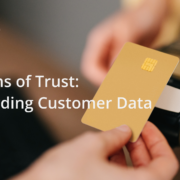Guardians of Trust: Safeguarding Customer Data
As the year ends and holiday shopping hits an all-time high, the security of customer information is critical. With each item added to the cart, customers place their trust in stores, entrusting them with personal and financial details. Any breach of this trust can result in severe consequences for both the customers and the business. To ensure airtight security and to build lasting trust, retailers must implement robust measures to safeguard customer information.
A few reminders as we head into holiday shopping:
Implement Secure Sockets Layer (SSL) Encryption
SSL encryption is the bedrock of secure online communication. Ensure that your website uses HTTPS, which encrypts the data transmitted between the user’s browser and your server. This prevents hackers from intercepting sensitive information during transmission.
Regularly Update Software and Systems and Back Up Customer Data
Outdated software is a vulnerable target for cyber threats. Regularly update your website’s content management system, plugins, and any other software to patch potential security vulnerabilities.
In the event of a security breach or data loss, having up-to-date backups is crucial. Regularly back up customer data and ensure that the backup system itself is secure.
Use Strong Authentication Measures
Enforce strong password policies for both staff and customers. Require the use of complex passwords and consider implementing two-factor authentication (2FA) to add an extra layer of security. According to the National Cyber Security Centre, 23.2 million breach victim accounts used 123456 as their password – making it the most commonly used password worldwide.
Payment Card Industry Data Security Standard (PCI DSS) Compliance
If your online store processes credit card transactions, adhere to PCI DSS standards. This includes secure card storage, regular system scans, and compliance with the Payment Card Industry’s stringent security requirements.
Employee Training on Security Best Practices
Human error is a common factor in security breaches. Researchers from Stanford University found that approximately 88 percent of all data breaches are caused by an employee mistake. Train your staff on security best practices, such as recognizing phishing attempts and the importance of data protection.
According to a follow up survey from Stanford, the percentage of employees who admit to falling for phishing scams at work decreases with age, and younger employees are 5x more likely to click on phishing emails than older employees. The survey found however, older respondents were more susceptible to smishing attacks (SMS phishing), compared to the younger employees.
Have you ever received a text from your company CEO asking you to purchase gift cards? Don’t fall for it. Your executive leaders will never send such a request, especially via text.
Creating a security-conscious culture among employees across each generation is crucial.
Regular Security Audits and Penetration Testing
Conduct regular security audits and penetration tests to identify and address potential vulnerabilities in your systems. This proactive approach helps you stay ahead of potential threats and ensure continuous improvement in your security measures.
Monitor for Suspicious Activities
Implement real-time monitoring tools to detect and respond to suspicious activities. Unusual patterns or multiple failed login attempts could be indicators of a security threat.
Incident Response Plan
Develop a comprehensive incident response plan outlining the steps to be taken in the event of a security breach. This includes communication strategies, notifying affected parties, and working towards a swift resolution.
As custodians of customer information, responsibility extends beyond checking the box on compliance requirements. Businesses must commit to fostering an environment where customers feel confident their information is secure. By implementing these robust security measures, online stores can fortify their defenses and protect the sensitive information entrusted to them by customers.
At RedSeal, we’re committed to fortifying your digital infrastructure. We proactively help visualize your network, identify attack paths, prioritize risk, and help you stay in compliance to ensure your business and customers stay secure.



